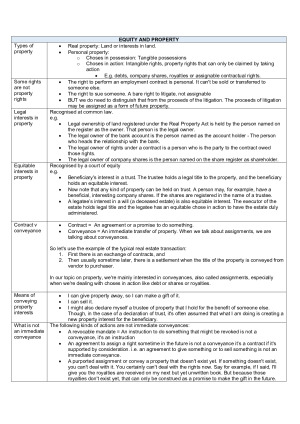EQUITY & TRUSTS NOTES
Subject notes for UTS 70517
Description
Module 1: HISTORY AND NATURE OF EQUITY Introduction to Equity - Comparison between common law and Equity Historical development of Equity - Maxims of Equity - Judicature System and modern administration of Equity Module 2: EQUITY AND THE LAW OF OBLIGATIONS? Doctrines of Unconscionable Dealing and Undue Influence - Undue Influence – elements and application - Unconscionable Dealing – elements and application - Remedies Estoppel - Categories of estoppel at common law and in equity - - - Proprietary Estoppel - Promissory Estoppel - Remedies Module 3: EQUITY AND PROPERTY – EQUITABLE INTERESTS IN PROPERTY AND ASSIGNMENT OF PROPERTY IN EQUITY - Equitable Estates and Interests - What is Property? - Multiple classification of equitable rights - Equitable proprietary interest, mere equity and personal equities - Examples of equitable proprietary interests - Assignment of Property in Equity - Equitable assignment of legal property - Equitable assignment of equitable property - Assignment of future property - Writing requirements for the assignment of equitable interests (Note: I have inserted all case law for Mod 1-3 after the end of my Mod 3 notes) Module 4: TRUSTS - Express Trusts - Elements of a trust - Creation of Express Trusts - Types of Express Trusts, including Charitable - The three certainties: intention, subject matter, object - Complete constitution, secret and precatory trusts - Charitable trusts - Duties, Powers, Liabilities and Rights of Trustees, Rights of Beneficiaries - Duties of a trustee - Powers of a trustee - Rights of a trustee - Liability of a trustee for breach of trust - Rights of beneficiaries and beneficiaries under a discretionary trust - Trusts imposed by Law – Resulting Trusts - Automatic resulting trusts - Presumed resulting trusts - Presumption of advancement Illegality - The Quistclose trust Module 5: EQUITABLE REMEDIES AND PROCESSES Constructive Trusts - Nature of a constructive trust Categories - Liability of Third Parties for Breach of Fiduciary Obligation or Breach of Trust - The rule in Barnes v Addy - Knowing receipt - Knowing assistance - Remedies - Tracing - Nature and purpose of tracing - Account of Profits - Nature of remedy - Calculation of account of profits - Equitable Compensation - Nature of the Remedy and its availability - Calculating Equitable Compensation
UTS
Semester 1, 2024
89 pages
45,000 words
$34.00
5
Campus
UTS, Broadway & Markets
Member since
November 2022
- Distinction Contracts Notes - UTS 70211
- HD Torts Notes - Torts UTS 70311
- Distinction Civil Practice Notes (Final Mark of 83) - Civil Practice 70104
- Distinction Australian Constitutional Law Notes (Final Mark: 81): Australian Constitutional Law 70616
- DISTINCTION (77) - Intro to Property & Commercial Law Exam Notes (Final Mark : 77)
